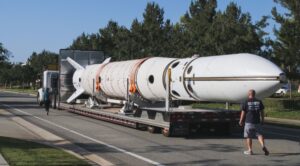Virgin Orbit gears up for captive carry test flight

RENTON, Wash. — Virgin Orbit is planning a key test of its LauncherOne system as soon as next week, a final step before the vehicle’s first launch later this summer.
In a speech at the NewSpace 2018 Conference here June 27, Stephen Eisele, vice president of business development of Virgin Orbit, said that company was gearing up for a “captive carry” test of its air-launch rocket, flown on a customized Boeing 747.
“We’re going to be doing our next major milestone in probably a little over a week, which is going to be a captive carry test,” he said. On that test, the 747 will take off with the LauncherOne rocket attached to its wing, but not launched.
That flight, he said, will gather “flutter and aerodynamics testing” data. “The next test after that is the first orbital flight.”
Workers will be attaching the pylon that holds LauncherOne to the aircraft’s left wing in the next few days, he said. “If everything goes well there, we’ll conduct our first captive carry test,” he said. The flight will take place from the Mojave Air and Space Port in California.
Only a single captive carry flight is currently scheduled, he said, but added “it doesn’t preclude us from doing another if needed.” That test will also include demonstrating the deployment mechanism, releasing the inert LauncherOne test article to drop back to Earth.
If that flight is a success, Eisele said the company would be ready to conduct its first orbital test of LauncherOne later this summer. “We’re hoping to be ready to fly by the end of the summer, but the precursors there are making sure everything goes well with the captive carry test and all the other test data we have to derive from that,” he said. “We have our first orbital rocket ready to go on the factory floor, so it really is pending just a few of these final qual tests.”
LauncherOne is designed for small payloads, with a capacity of 300 kilograms to a 500-kilometer sun-synchronous orbit. Initial missions will be flown out of Mojave, but the company is also planning flights from sites on the East Coast and the Pacific, and has the flexibility to operate from almost any airport that can accommodate a 747.
Earlier June 27, the founder of Virgin Orbit, Sir Richard Branson, recounted in a blog post a recent visit to the company’s facilities. That included seeing tests of the NewtonThree engine that powers the rocket’s first stage and the NewtonFour used on the rocket’s upper stage. “The Virgin Orbit team still have final checks to do, but I’m so proud of all the hard work that is clearly paying off,” he wrote.
The company has not disclosed what payloads, if any, will fly on that inaugural LauncherOne mission. Asked about that, Eisele offered a humorous comparison to the first flight of SpaceX’s Falcon Heavy rocket in February, which launched a Tesla Roadster sports car. “The first payload? It’ll be 12,000 mini Tesla Matchbox cars,” he said.
“That’s not the payload,” he added.
from SpaceNews.com https://ift.tt/2lDpPHr
Comments
Post a Comment